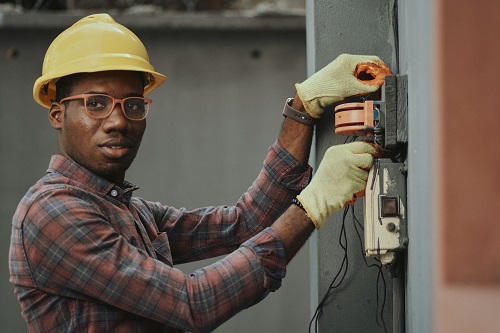We often only notice when we need their help, but let’s recognize that electricians are critical for the everyday things we need to power.
Electricians light up our homes and power our buildings. Without them to install, repair, troubleshoot and maintain electrical systems and equipment, there would be no energy flow.
Within the residential, commercial, and industrial sectors, they can be employed by electrical contractors and building maintenance departments, or they may be self-employed professionals. Regardless, they are in a highly respected trade that requires a tremendous amount of knowledge and skill to work with electricity daily. As a result, the demand for electricians will only keep growing.

As current electricians retire, it’s estimated Canada will need thousands of new electricians within 10 years. That makes pursuing a career as an electrician or starting your own business in the trade ideal.
For example, On-Site magazine reports Ontario is offering to pay for electrician apprenticeships to fill the looming shortage of skilled electricians the province is facing.
“As technology continues to evolve, this in-demand trade not only provides a fulfilling career for young people and underrepresented populations, but their skills will be critical to helping build and sustain Ontario’s infrastructure well into the future,” says James Barry, the Executive Secretary-Treasurer, International Brotherhood of Electrical Workers (IBEW) Construction Council of Ontario.
What Training and Certification Are Required to Become an Electrician?
Before thinking of starting your own business, you need to complete mandatory electrician training and certification.
The process requires time and commitment and varies from province to province. But you can begin training and completing an electrician apprenticeship in Ontario if you are over 16 years of age and have completed Grade 12. Your apprenticeship will likely take five years while you alternate back and forth between classrooms and paid on-the-job training. Contact a local branch of the IBEW in your region for assistance finding a placement with an electrical contractor.
Once initial training is complete, you can apply to write the Certificate of Qualification exam for electricians. You can register as a Journeyperson Class with the Ontario College of Trade if you pass.
You may also want to consider earning the Interprovincial Standards Red Seal Program designation for electricians. It is recognized across Canada and stands for a high standard of excellence. It allows you to work as an electrician anywhere in Canada and could help make your future business stand out from the rest.
Once you’re trained and certified, it is advised that you acquire several years of experience working for someone else to learn the intricacies of the business and gain some on-the-job skills practice. Securing an apprenticeship and gaining valuable experience as an electrician can also help you when applying for electrician insurance. One of the things an insurance company will ask about is your years of experience.
What Types of Services Do Electricians Provide?
Being your own boss by starting an electrical business is an exciting and empowering venture, but it can be overwhelming to get it started. There are a lot of steps and requirements involved, so it’s essential to know what that’s going to take.
Your electrician business could choose to focus the services you provide on either of the two main types of electrical work:
1. Indoor electricians or linemen: An electrician that works on electrical transmission networks. They operate at higher voltages on wires that move electricity from substations to customers.
2. Outdoor electricians or wiremen: An electrician that installs, maintains, and repairs interior wiring systems. They may install alarm and door and gate systems, receptacles, light fixtures, and fans.
You can then choose to concentrate on performing your electrician services in one of the following areas:
- Residential electrical services: The focus is primarily on working for homeowners in their houses. Residential home energy consumption is relatively low, and homes use only single-phase power.
- Commercial electrical services: The focus is on electrical installations in buildings, offices, shopping malls, and schools for industries such as construction. Commercial buildings draw a lot of power, and you must use three-phase power.
- Industrial electrical services: The focus is on electrical installations, troubleshooting, and repairing in power plants, processing plants, factories, and mines.
What Equipment Do Electricians Need?
Electricians need to invest in high-quality tools and safety gear, including:
- Pliers. The two most common ones required are side-cutting pliers and long-nose or needle-nose pliers.
- Screwdrivers and nut drivers. You will need several screwdrivers and nut drivers to work with various fasteners and applications.
- Wire strippers.
- Fishing tools. You should have fish tapes (fibreglass and steel tapes) and fish poles (fish pole wire-installation tools facilitate wire pulling in drop ceilings, walls, or under raised floors).
- Measuring devices. Laser measuring tools are becoming popular but getting a traditional tape measure with magnetic tips to stick to iron and steel surfaces.
- Labelling machines. These handheld tools save time when making moves, adds, and changes.
You will also need some power tools, including:
- Power drills and drivers, hammers, drills – consider multipurpose options, as the type needed varies with the application.
- Power saws – for versatility and dependability, handheld reciprocating saws are one of the most popular. Other types of saws used for electrical work include spiral saws, hole saws, cut-off saws and portable band saws. Needs vary based on the application.
Also, be sure to acquire the following miscellaneous supplies:
- Headlamps, magnetic trays, knee pads, safety goggles, and cut-resistant gloves.
- A reliable equipment supplier for wiring, solder, and other items.
- A van, truck, or a large car for jobs.
- An office to work and store your tools and supplies.
Getting insured is quick and easy!
Complete our 5-minute online application for a free electrician insurance quote.
Related Posts
Sign Up for ZenMail
"*" indicates required fields
Categories
How Profitable Is It to Be an Electrician?
Overall, the electrical business is profitable, but the extent can depend on your location, the size of your business, and your sales. It is also affected by how you run your business and should reflect if you’ve managed it well. You can grow a small electrical business into a successful business with the right approach.
How Much Does It Cost to Start an Electrician Business?
When you are determining how much it costs to start an electrical business, understand that you will need access to funds for start-up costs. You can investigate applying for grants and loans from banks or credit unions. Starting a company generally requires an upfront investment of at least $5,000 to $10,000. Once financing is covered, you can begin to grow your business.
You will need to allocate funds for costs, which can vary across Canada, depending on many factors, including your location, business size, and target market. They usually take the form of:
- Registration of your business
- Licensing and certifications
- Permits for jobs
- Union membership fees
- Pay for employees
- Overhead, equipment, office space, and a vehicle (a list of items will appear later in this article).
- Insurance to protect yourself, your business, employees, and clients
What Kind of Insurance Does an Electrician Need?
When providing electrical repair services as an electrical contractor or electrician business owner, you need an insurance policy built to protect against the many risks associated with the work.
Electrician insurance protects your business when things go wrong, whether you’re a residential electrician or you work at industrial or commercial sites. Among the types of coverages your electrical business may need to include:
- Commercial general liability insurance: A basic form of liability coverage that protects electricians against day-to-day risks encountered while running your business, such as third-party bodily injury or property damage.
- Professional liability insurance: Also known as errors and omissions insurance, it offers coverage for misconduct, negligence, or failure to deliver a service as advertised.
- Equipment and tools insurance: Covers the loss or damage to the tools and hardware you need for your projects. This policy covers the equipment you use to complete your job – whether you own the equipment or it’s in your care.
You should also consider the following coverages based on your services:
- Pollution liability insurance: Electricians may need this type of coverage for financial support from pollution-related accidents.
- Commercial auto insurance: Any vehicle used to transport materials, tools and equipment, packaged goods or people should have a commercial auto policy to safeguard it from third-party liability and property damages when operating any vehicle for business purposes.
The policy you need should be tailored to suit your business.
Fill out an online application to get a free quote. Our licensed brokers will shop our network of more than 50 leading Canadian insurance providers to find you the coverage you need at the best price and will customize the policy to ensure you’re adequately protected.
Related Posts
How to Start a Business in Ontario: A Step-by-Step Guide for New Entrepreneurs
Thinking about starting a business in Ontario? This beginner-friendly guide walks you through the key steps – from planning and registration to taxes, funding, and insurance – so you can start confidently and grow as you go.
How to Become a CrossFit Instructor
A CrossFit coach or instructor is a fitness professional trained to teach, motivate, and supervise individuals or groups performing high-intensity CrossFit workouts. See our guide on how to establish your career as a CrossFit trainer in Canada, and how to protect your finances with liability insurance.
How to Start a Business in British Columbia (B.C.)
Thinking of venturing out on your own and starting a small business in Canada’s westernmost province? This brief guide aims to simplify the process of starting a business in British Columbia (B.C.). Learn what the essential legal requirements are, how to structure your company, and the steps you should take to bring your ambitions to life.








